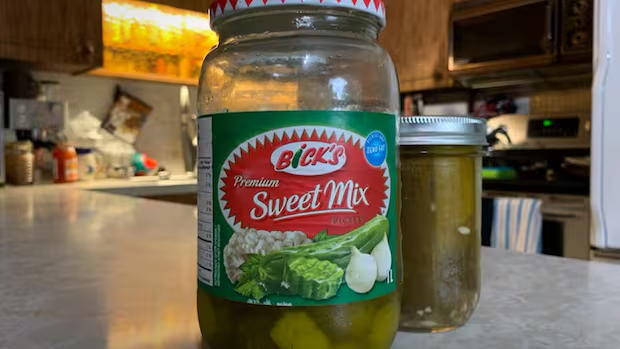Bick’s Pickles Facing Shortages in Canada: What’s Behind the Disappearing Jars and the Rise of Local Alternatives
August 11, 2025 2025-08-11 18:10Bick’s Pickles Facing Shortages in Canada: What’s Behind the Disappearing Jars and the Rise of Local Alternatives

Bick’s Pickles Facing Shortages in Canada: What’s Behind the Disappearing Jars and the Rise of Local Alternatives
For decades, Bick’s pickles have been a familiar sight in Canadian kitchens, topping burgers, enhancing sandwiches, and adding tang to countless family recipes. But in recent months, consumers across the country have noticed a troubling trend—empty shelves where Bick’s once stood. The scarcity has sparked widespread discussion about trade policies, brand ownership, and the growing appeal of locally produced alternatives.
A Canadian Brand with American Ownership
Bick’s began as a family-run operation in the Toronto area, eventually becoming one of Canada’s best-known pickle brands. Over time, the business changed hands, ultimately becoming part of the U.S.-based J.M. Smucker Company. In late 2023, Smucker completed the sale of Bick’s and other fermented condiment brands in Canada to TreeHouse Foods, an Illinois-based food manufacturer, for approximately US$20 million. While the label still carries nostalgic value, some Canadian consumers now view it as less authentically local than in its early years.
Tariffs and Trade Policy Driving Change
One of the key reasons for reduced availability is a 25 percent retaliatory tariff imposed by Canada on certain U.S.-assembled goods. Because many Bick’s pickles are now processed or packaged outside of Canada, these tariffs have increased costs for importers and retailers. For some grocery chains, stocking Bick’s at higher prices has become less attractive, leading to scaled-back orders and patchy distribution.
This illustrates how trade policy can directly affect household shopping habits. Tariffs designed to protect domestic industries can also alter consumer choice, sometimes accelerating the shift toward local brands.
The Consumer Reaction
News of the shortages has sparked lively discussion on social media platforms such as Reddit. Many Canadians are expressing frustration that a once-iconic brand is no longer fully Canadian in production or ownership. Others are using the opportunity to explore homegrown pickle options and support small-scale producers.
Some consumers have shared tips for finding Bick’s products in smaller, independent shops or bulk food outlets, but most agree that availability is inconsistent. The sentiment is a blend of nostalgia for the brand’s Canadian roots and a growing willingness to try alternatives.
The Rise of Canadian Pickle Brands
With Bick’s losing shelf space, local pickle makers are seizing the moment. Brands such as Putters, Lakeside, Brine & Co., and Oak Barrel are increasingly visible in major grocery chains and farmers’ markets. Many of these companies emphasise Canadian-grown cucumbers, traditional fermentation methods, and recipes tailored to local tastes.
Beyond supporting domestic agriculture, buying local can also shorten supply chains, reduce environmental impact, and keep more economic value within the country. For consumers who care about freshness, origin, and sustainability, this shift offers an appealing alternative to imported products.
Economic and Cultural Significance
Pickles might seem like a small part of the national food landscape, but the Bick’s shortage touches on broader themes in Canada’s economy. It raises questions about how trade agreements, tariffs, and corporate ownership influence what ends up in our shopping baskets. It also reflects a cultural desire to preserve Canadian identity in food products, especially those with a long history in the country.
The move away from Bick’s for some consumers isn’t just about price or availability—it’s about aligning purchases with values. In an era where shoppers are increasingly conscious of where their food comes from, the story of Bick’s is a reminder that even everyday items can carry deeper meaning.
What’s Next for Bick’s and Canadian Consumers
The future of Bick’s in Canada depends on several factors. If trade tensions ease, tariffs could be reduced, making it easier to bring the products back at competitive prices. TreeHouse Foods could also invest in more Canadian-based production to restore the brand’s local image and reduce import costs.
For now, consumers looking for Bick’s pickles may have to be persistent—or open to trying the growing range of Canadian options. As local brands gain market share, this could mark the start of a longer-term transformation in Canada’s pickle market.
Whether driven by policy changes, nostalgia, or a desire to support domestic producers, Canadians’ pickle choices are evolving. The empty shelves may frustrate some shoppers, but they also represent an opportunity for homegrown brands to shine.


